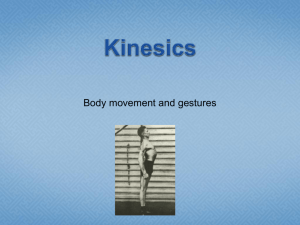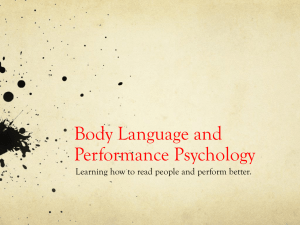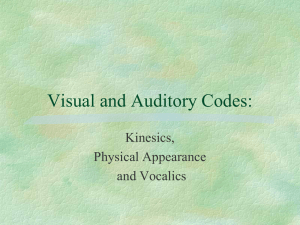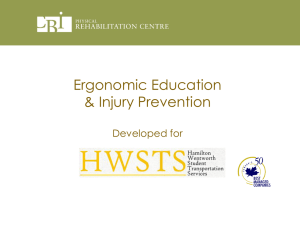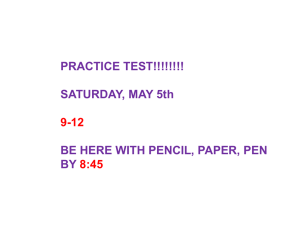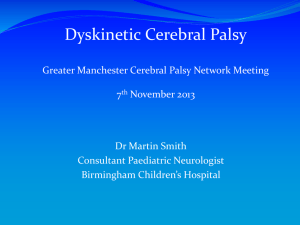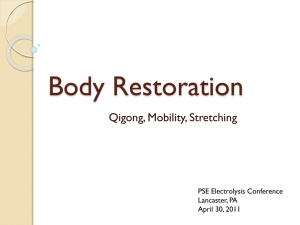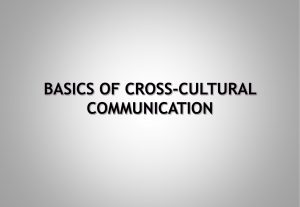Body Language and Performance Psychology
advertisement
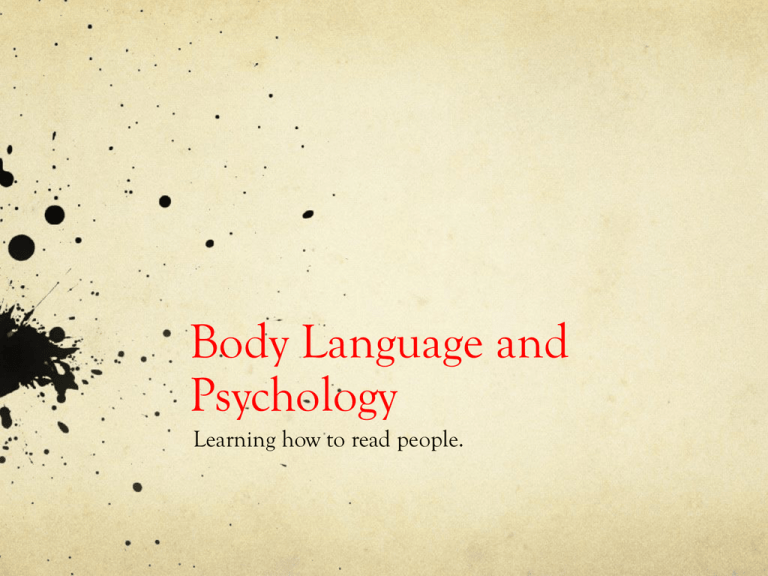
Body Language and Psychology Learning how to read people. Body Language The most important six aspects of bodily action: Movement Eye contact- is one of the most important aspect of bodily communication. Facial expression- is one of the most important aspect of bodily communication. Posture- is the position in which body is being held. Gestures- a movements that are made with hands, head or face to show a particular meaning. Proxemics- is the study of how to use space in communication. Body Movements Major types of movement: Emblems Illustrators Affect displays Regulators Adaptors Emblems Emblems are body gestures that directly translate into words or phrases. Emblems are used consciously and purposely to communicate the same meaning as the words. Emblems are culture specific. Illustrators Illustrators enhance the verbal messages they accompany. Expressions are often illustrated with hands, head and general body movements. Illustrators, 20% increase an ability to remember. Affect Displays Affect displays are movements of the face, but also the hands and general body that communicate emotional meaning. Affect displays are often unconscious. Regulators Regulators are behaviors that monitor, control, coordinate, or maintain the speaking of another individual. Adaptors Adaptors are gestures that satisfy some personal needs. Adaptors are divided into: Self adaptors (self touching movements) Alter – adaptors (movements directed at a recipient) Object – adaptors (gestures focused on objects) Influencing with Body Language To influence you need to have a relationship and all relationships fall into two categories. Positive (interest) Negative (noninterest) -Pupils dilate Advertising Lying and/or deception Detecting interest from a possible mate/date List some non-verbal cues for the following: Someone interested Someone not interested exposure of elbow crease Arms fold across chest long eye contact Rigid stance Angled stance Continuing to square up to you Relaxed posture Touching of the hand, leg, shoulder or face Glancing past you Fidgeting Translate these non-verbal cues: -Lifting an eyebrow Disbelief -rubbing your nose Puzzlement -clasping your arms Protecting ourselves -wink one eye Seeking intimacy -tap finger impatience Territorial needs Everyone has a defined body area, a territory, and a personal space, which is called a body buffer zone Summarize Intimate distance: Acceptable for family, friends, lovers, and parent/child (touching 18 inches/ 0-6 inches in Latin Cultures) - -If confined w/strangers body must remain rigid to indicate apology for touching -Glances are ok but long gazes are seen as completely inappropriate Personal Distance Close (18-30 inches) -ex. wives and husbands, when others move in it portrays interested , can hold hands Far (30-48 inches) called “limit of physical domination, acceptable for meeting someone on the street Social Distance Close (4-7 feet) transact interpersonal business, house wife/repairman, meeting someone new, boss greeting an employee Far (7-12 feet) Formal social or business relationships, Big boss and employee. This distance means steady eye contact during conversation, failure to do so is disrespectful. Can allow you to keep working w/out seeming rude. Public Distance Close (12-25 feet) teacher addressing student Far (25 or more) Politicians (for safety) In order to develop a relationship, of any kind, what must first happen? Both must unmask and show their true selves, for if not they can not become close T/F Smiling is the most common mask we wear, and it is one that is over used. True. Most masking techniques are taught through culture and are considered “manners” or “etiquette” When do we drop our masks? When we are intimately comfortable w/ the person or when we see them as a non-person (it) *Extreme ends of the spectrum/usually worn to protect someone's feelings or our own Besides your clothes, what is the 1st thing people notice about you? How can this help you obtain a date? Guys Stance or Walk Girls Stance Provides messages as to your intentions Uninterested or Defensive Hips forward w/ legs spread Arms crossed Thumbs locked on belt with fingers pointed inward Rigid Posture Tight Face Interested Expose neck, elbow crease, open stance Counter these by offering up complimentary & opposing body language. If trying to show interest hold your gaze or glance longer than appropriate (just a little/ don’t be a creepy) . What things can be done after gaining someone’s attention to progress to a more intimate encounter? After flirting as commenced: Invade body space minimally enough for obvious objection. Stay till they become comfortable Let eyes linger in areas where short glances would be necessary Stare into her/him while drawing attention to places like mouth, neck, chest, groin. Attention must be narrowed to that one person, not spread around to others What are some ways you can tell if he/she is available? Look for a ring or pale skin on the ring finger Stance while sitting Knees apart/ holding gaze/ loose posture Gestures Draws attention to mouth, neck, thighs, chest, hips, butt Walk Hips forward or loose/ sway or swagger of hips/ shoulders back 7 head up What happens to both men & women upon meeting someone they are interested in breeding with? -Step 1 Posture Changes •Muscles Tense •Body sagging disappears •Posture becomes erect •Stomach tightens •Face Blushes or glows •Preening begins Adjusting of clothes/ hair/ makeup What happens to both men & women upon meeting someone they are interested in breeding with? Step two- Positioning • Couples will sit together • Face each other • Lean into one another • Use arms to make a circle • Cross their legs towards each other What are some things a less aggressive woman might do to convey interest to a man? • Flirting glances • Holding his eye • Turning her head to one side (expose neck) • Rolling her lips • Revealing the top of her thigh by crossing her legs • Putting her hand on her hip • Exposing her wrist or palm What can posture be used to transmit? • Question • Protection • Statement • Inclusion • Interest • Exclusion • Non- Interest What are the “rules of thumb” for looking at a person in the following situations: (careful cultural) Passing someone on the street: Must look away when within 8 feet People with unusual hair, clothes, facial hair, hair or piercings: Stare then look away Putting a person down: Stare and continue Make sure to follow these rules as not to be socially awkward!!! NLP Eye Chart (caution) True/False When studying kinesics, one must take all of the following into account: 1. Situation 2. All body movements at the time 3. Any physiological patterns True- No single motion stands alone, there is always a pattern
